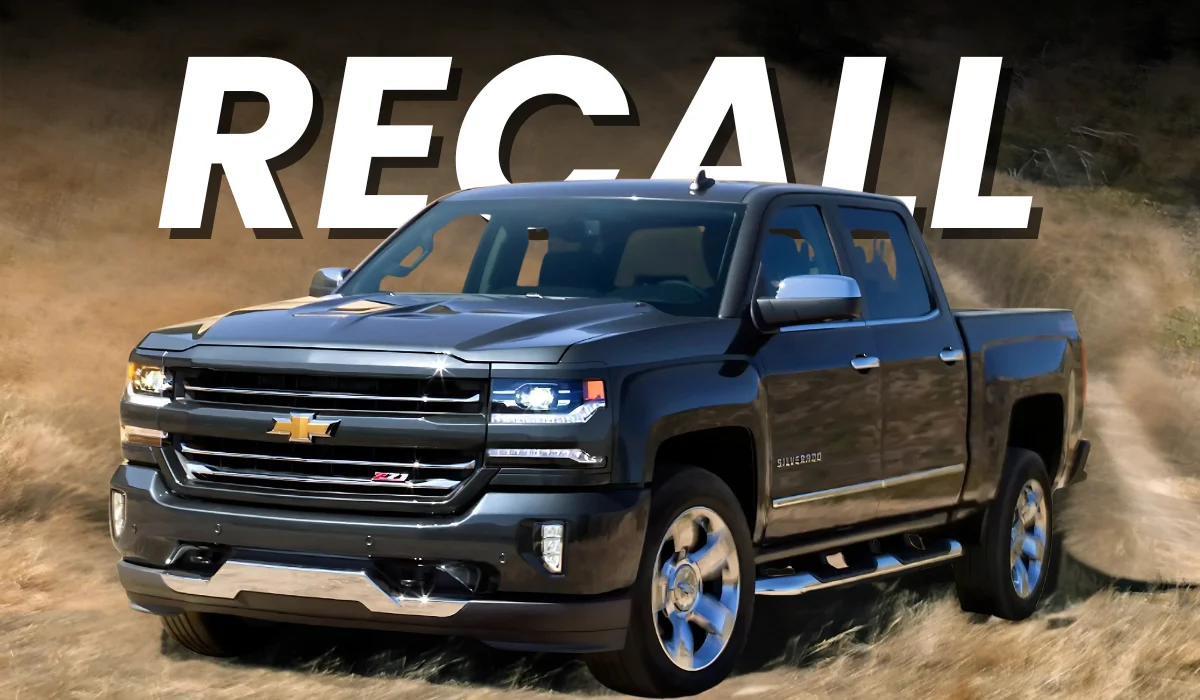GM Recalls: Something odd—and scary—is happening with some Chevy Silverado and GMC Sierra trucks. Drivers are hearing a loud pop in the roof rail—even when parked. Later, they’re finding metal bits inside. No crash. Just silence, then chaos.
That’s because the roof‑rail airbag inflator end cap can pop off due to a crack. When it does, compressed gas escapes fast, and metal pieces may shoot into the cabin. It’s scary for anyone sitting inside.
Now GM is recalling about 2,000 crew‑cab trucks made in 2018–19. They’ll replace both left and right airbags for free. But until owners act, even parked vehicles can turn dangerous.
Which trucks are affected—and what you should do now
This recall isn’t random. It only covers:
- 2018 Silverado 1500
- 2018–19 Silverado 2500/3500
- 2018 GMC Sierra 1500
- 2018–19 Sierra 2500/3500 Crew Cabs only
That’s it. But owners of other Silverado/Sierra models—like earlier or regular cab versions—should still check their VIN, just to be safe.
GM started telling dealers in late June. Owner mailers go out August 11, 2025. But don’t wait. You can check your VIN now on GM’s recall site or by calling the dealer.
They’ll update the airbags free, no time limit. Replacing both sides takes a few hours. And you might even get a courtesy ride from the dealership.
Behind the defect: why this pops up now
Usually airbag recalls happen after a crash. This one doesn’t need one. The problem stems from Joyson Safety Systems—the company that took over Takata airbag tech in 2018.
A crack in the inflator sidewall can let the end cap fly off unexpectedly. No one’s been hurt… yet. But metal flying near your head isn’t something to take lightly.
The worst part: parts need to come from outside the suspect batch, so the fix is new, not just reusing old components. Dealers must also log the serial numbers of each new airbag. It’s meticulous, but needed for safety and accountability.
Fresh angles nobody else is talking about
Let’s get into even more detail:
- The danger when parked: This isn’t an issue with a crash. This could happen in a driveway, or worse, a garage! Imagine stepping into your parked truck and seeing bits of metal — horrific.
- Used-truck tips: Buyers need to check the replacement history of these lots of variations of almost similar crew-cabs from those years will undoubtedly be sold as used. A “replaced” tag could make a huge difference between safe and risky.
- Repair complexity: The technician is required to follow numerous steps, it requires a lot more than a simple part exchange. Ambient interior temperature makes a difference; proper paperwork and traceability application processes matter too. This is a lot more of a laborious process than simply replacing a part.
- Takata tie-in: Despite these not being classically referred to as Takata inflators, the original Takata inflators from way back still all come from the same ancestry traceable to that flawed safety history/legacy. It alludes to the notion that older technologies can create new hazards.
How owners feel—and what they’re saying
Some surprised owners took to social media. Here’s a recent tweet from the official NHTSA account:
“⚠️ Recall Alert 2018 GMC Sierra crew cab trucks—roof rail airbag end cap may detach. Check your VIN.”
Those comments show people are spooked. No one expects an airbag to pop out metal when the truck is parked. It’s a wake‑up call.
What drivers should do next
If you own a 2018 or 2019 crew cab Silverado or Sierra:
- Check your VIN via GM’s recall portal or call your local dealer.
- Listen for any pop near the roof rail—day or night.
- Schedule the free repair ASAP, don’t wait for the letter.
- Ask for proof of the inflator’s replacement—especially if buying used.
- Stay aware: GM might expand the recall into other models sharing the same parts soon.
Why this matters to you—and what GM is learning
This recall is more than a temporary scare. It touches on trust, quality, and transparency.
- Owner trust: Airbags are supposed to protect you. When they misbehave, it hurts the brand.
- Complex parts need care: This shows how even internal safety systems require precise handling—temperature, tracking, new part sourcing.
- Takata’s ripple effect: Even post-Takata, parts can still carry forward risks if not fully vetted.
- Buying used? Stay alert: This pushes everyone to double-check history and repairs before driving off.
GM is doing the right thing. But this could have been caught earlier. It raises the bar for all automakers: Safety isn’t just about crashes—it’s about trust, always.
GM Recalls: Quick Steps for Owners
- VIN check
- Dealership contact
- Scheduled repair
- Ask for replacement proof
- Verify if buying used
FAQs
Which models are included in the recall?
This covers 2018 Silverado 1500 and 2018–19 Silverado 2500/3500, plus 2018 Sierra 1500 and 2018–19 Sierra 2500/3500 Crew Cabs only.
What’s wrong with these airbags?
The end cap on the roof‑rail airbag inflator can detach even without a crash, sending metal into the cabin.
Can this happen when parked?
Yes. Reports describe loud pops inside the truck while parked, without any crash or impact.
Have there been injuries?
No injuries reported so far, but metal fragments near occupants can cause serious harm.
How do I know if my truck is affected?
Check your VIN on GM’s recall site or call your Chevy/GMC dealer. Mail notifications arrive Aug 11, 2025.
How long will the repair take?
Expect a few hours at the dealer. The parts and labor are free.
I’m buying a used crew cab—what should I check?
Ask if the recall repair was done, and request documentation showing the new inflator parts were installed.
Will GM expand the recall?
Possibly. If trucks using the same parts are found with issues, the recall may grow to include more models.

